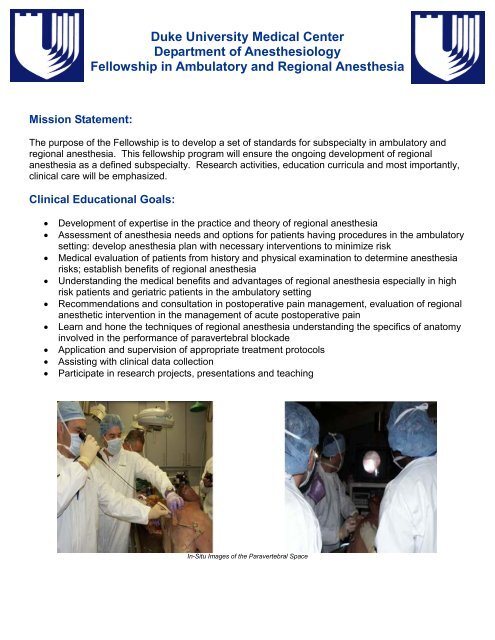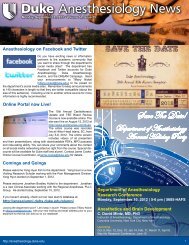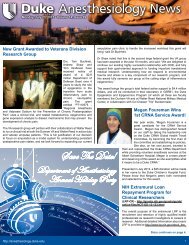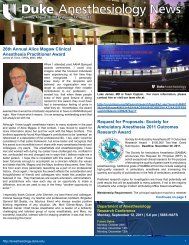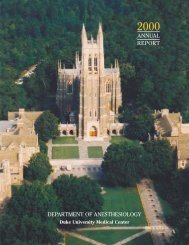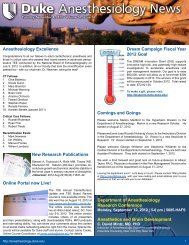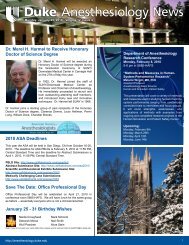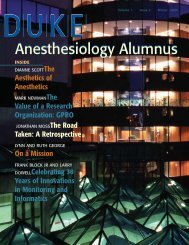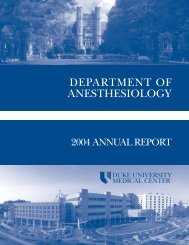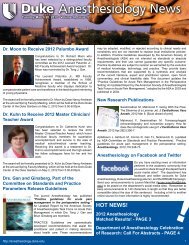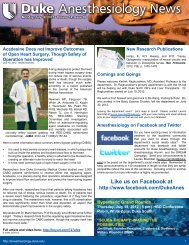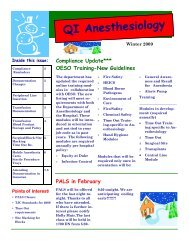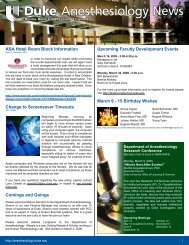Duke University Medical Center Department of Anesthesiology ...
Duke University Medical Center Department of Anesthesiology ...
Duke University Medical Center Department of Anesthesiology ...
You also want an ePaper? Increase the reach of your titles
YUMPU automatically turns print PDFs into web optimized ePapers that Google loves.
Mission Statement:<br />
<strong>Duke</strong> <strong>University</strong> <strong>Medical</strong> <strong>Center</strong><br />
<strong>Department</strong> <strong>of</strong> <strong>Anesthesiology</strong><br />
Fellowship in Ambulatory and Regional Anesthesia<br />
The purpose <strong>of</strong> the Fellowship is to develop a set <strong>of</strong> standards for subspecialty in ambulatory and<br />
regional anesthesia. This fellowship program will ensure the ongoing development <strong>of</strong> regional<br />
anesthesia as a defined subspecialty. Research activities, education curricula and most importantly,<br />
clinical care will be emphasized.<br />
Clinical Educational Goals:<br />
• Development <strong>of</strong> expertise in the practice and theory <strong>of</strong> regional anesthesia<br />
• Assessment <strong>of</strong> anesthesia needs and options for patients having procedures in the ambulatory<br />
setting: develop anesthesia plan with necessary interventions to minimize risk<br />
• <strong>Medical</strong> evaluation <strong>of</strong> patients from history and physical examination to determine anesthesia<br />
risks; establish benefits <strong>of</strong> regional anesthesia<br />
• Understanding the medical benefits and advantages <strong>of</strong> regional anesthesia especially in high<br />
risk patients and geriatric patients in the ambulatory setting<br />
• Recommendations and consultation in postoperative pain management, evaluation <strong>of</strong> regional<br />
anesthetic intervention in the management <strong>of</strong> acute postoperative pain<br />
• Learn and hone the techniques <strong>of</strong> regional anesthesia understanding the specifics <strong>of</strong> anatomy<br />
involved in the performance <strong>of</strong> paravertebral blockade<br />
• Application and supervision <strong>of</strong> appropriate treatment protocols<br />
• Assisting with clinical data collection<br />
• Participate in research projects, presentations and teaching<br />
In-Situ Images <strong>of</strong> the Paravertebral Space
Program Design:<br />
The Fellowship in Ambulatory/Regional Anesthesia is designed to provide advanced training in<br />
anesthesia in the ambulatory surgery setting. This program will be an extension to previous training<br />
with an emphasis on a continued educational component to include research, clinical and teaching<br />
responsibilities. The program will train participants in various regional anesthesia techniques that are<br />
used to enhance the perioperative experience <strong>of</strong> one day surgery patients. These anesthesia<br />
techniques are beneficial in their postoperative pain management and in the reduction <strong>of</strong><br />
postoperative nausea and vomiting. The anesthesiologists in the fellowship will also gain invaluable<br />
experience with the use <strong>of</strong> continuous peripheral nerve catheters which control pain up to 2-4 days<br />
after surgery. The fellows continue the use <strong>of</strong> general anesthesia during their fellowship, however, the<br />
mission and objective <strong>of</strong> the fellowship is to teach the specialized advanced regional anesthesia<br />
techniques. Mastering <strong>of</strong> the various techniques will prepare the fellowship participant to successfully<br />
utilize these skills to provide anesthesia and analgesia options to the ambulatory surgery population.<br />
Fellows will be encouraged to submit an abstract at the American Society <strong>of</strong> Anesthesiologists annual<br />
meeting as well as conduct clinical investigations and clinical outcome studies for Regional<br />
Anesthesia.<br />
A further objective <strong>of</strong> the fellowship is for the participant to develop a working knowledge <strong>of</strong> the fast<br />
pace <strong>of</strong> an ambulatory surgery center. It will be important to evaluate anesthesia risk and necessary<br />
interventions to minimize risk as well as understand how to safely and successfully provide optimal<br />
anesthesia care to patients in this setting.<br />
A successful fellowship participant will soon be able to identify the best regional anesthesia technique<br />
suited for the type <strong>of</strong> surgery to be performed. During the training, the ability to reach the proper<br />
conclusion regarding the anesthesia techniques to be utilized for special procedures is evaluated.<br />
The development <strong>of</strong> the skill and technique to administer the necessary regional anesthesia<br />
techniques is the primary goal and objective <strong>of</strong> the fellowship. This learning process is monitored and<br />
supervised closely by the attending anesthesiologists in the Division <strong>of</strong> Ambulatory Anesthesia.<br />
The program curriculum is established by the attending anesthesiologists in the Division <strong>of</strong><br />
Ambulatory Anesthesia all <strong>of</strong> whom are Board Certified Anesthesiologists or equivalent and have<br />
completed a fellowship in regional anesthesia and are practitioners in a division which demonstrates<br />
expertise in regional anesthesia. The program is reviewed yearly by the teaching group <strong>of</strong><br />
anesthesiologists.<br />
Program Requirements:<br />
The work environment allows fellows to have a non-clinical day per week to dedicate to research and<br />
project activities. Duty hours for the fellow are posted on the operative schedule and begin at 6 am<br />
and end when the last patient is discharged from PACU or housed in the Recovery Care <strong>Center</strong> with<br />
appropriate orders written. Duty call is monitored daily. Fellows are required to attend<br />
<strong>Anesthesiology</strong> Grand Rounds and are encouraged to attend other <strong>Department</strong>al educational<br />
sessions. Fellows represent the <strong>Department</strong> at national meetings, conferences as well as prepare inservice<br />
teaching on site departmentally. Fellows are expected to be involved in at least one<br />
publication while participating in the fellowship.
Scholarly Activity:<br />
Contribute to the science <strong>of</strong> regional and ambulatory anesthesia by participating in clinical<br />
and/or laboratory research -given non-clinical time to fulfill these goals. Participate in the didactic<br />
curriculum for resident education and other clinical teaching. Academic education objective which<br />
assures skill development in: -the ability to formulate clinically relevant hypotheses in regional and<br />
ambulatory anesthesia -execution <strong>of</strong> research projects -introduction to statistical analytical techniques<br />
utilizing patient outcomes database -presentation <strong>of</strong> research at an educational meeting while<br />
participating in the fellowship.<br />
Fellows participate in research, outcomes, writing for journals and publications as well as in-service<br />
training to nursing staff, etc. Fellows participate in journal clubs, roundtable discussions, grand rounds<br />
and lectures. There are opportunities for the fellow to become involved in research already in<br />
progress or to develop an original project. Activities considered as academic projects include a<br />
research paper or case report submitted to a peer-review journal and presentation <strong>of</strong> a clinical chart<br />
review or a review article submitted to and accepted by a peer-reviewed journal, a book chapter or<br />
other endeavor.<br />
Selection Process:<br />
The selection process for fellows includes the completion <strong>of</strong> a Fellowship Application which is to be<br />
substantiated by three letters <strong>of</strong> recommendation from experts in the field. In addition to the letters <strong>of</strong><br />
reference the application is to include a current CV and a letter <strong>of</strong> affirmation stating interest in the<br />
program. Applications are closely reviewed by all the attending anesthesiologists <strong>of</strong> the Division <strong>of</strong><br />
Ambulatory Anesthesia. Potential candidates will have interviews scheduled at <strong>Duke</strong> <strong>Medical</strong> <strong>Center</strong>,<br />
<strong>Department</strong> <strong>of</strong> <strong>Anesthesiology</strong> with members <strong>of</strong> the Division <strong>of</strong> Ambulatory Anesthesia participating in<br />
the interview process.<br />
Deadlines for receiving applications:<br />
August 15 prior to Fellowship year (i.e. for Fellowship year 2010-2011 application due on or<br />
before August 15 <strong>of</strong> 2009). Interviews will be completed by October 15 prior to Fellowship<br />
year.<br />
Contact Information: Stephen M. Klein, M.D.<br />
Associate Pr<strong>of</strong>essor <strong>of</strong> <strong>Anesthesiology</strong><br />
Chief, Division <strong>of</strong> Ambulatory Anesthesia<br />
<strong>Medical</strong> Director <strong>of</strong> Ambulatory Surgery <strong>Center</strong><br />
<strong>Department</strong> <strong>of</strong> <strong>Anesthesiology</strong>, Box 3094 #4<br />
<strong>Duke</strong> <strong>Medical</strong> <strong>Center</strong><br />
Durham, NC 27710<br />
or<br />
LuAnne Latta, Staff Assistant to Dr. Stephen M. Klein<br />
latta005@mc.duke.edu or 919-681-9941


